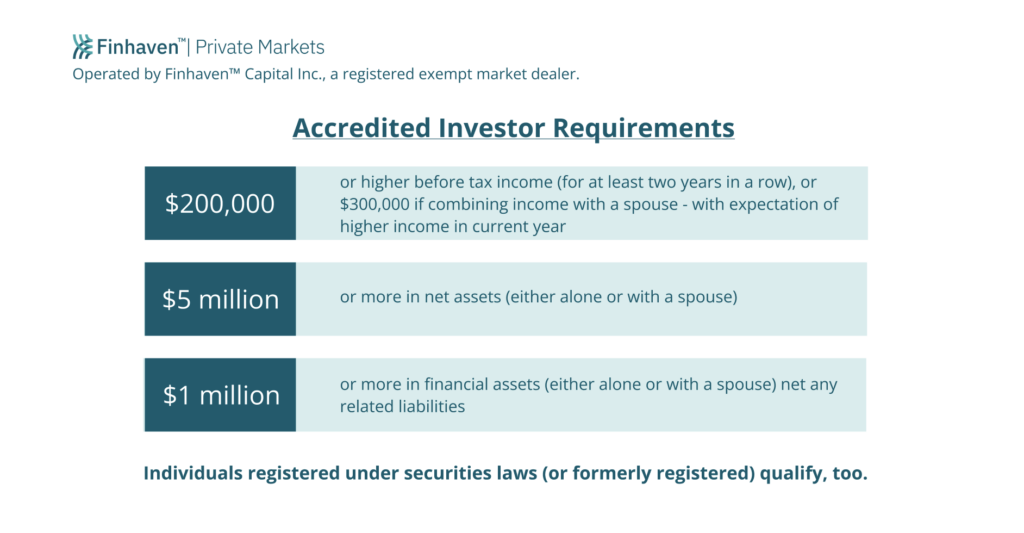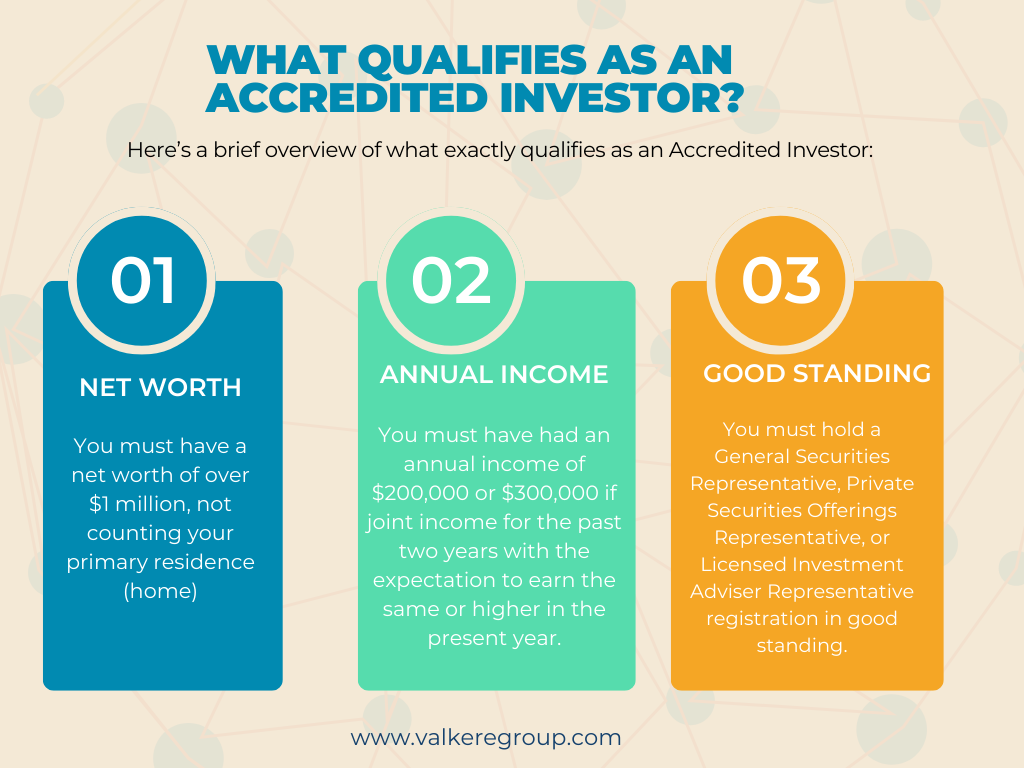All Categories
Featured
Table of Contents
A specific need to have a total assets over $1 million, leaving out the primary residence (independently or with spouse or companion), to qualify as a certified financier. Demonstrating adequate education and learning or task experience, being a signed up broker or financial investment expert, or having specific professional certifications can additionally certify a private as an accredited financier.
Certified investors have accessibility to financial investments not registered with the SEC and can include a "spousal matching" when establishing credentials. Certified capitalists might deal with prospective losses from riskier financial investments and need to prove monetary sophistication to take part in unregulated financial investments (how to become an accredited investor canada). Accredited capitalist condition issues due to the fact that it determines eligibility for financial investment possibilities not offered to the public, such as private positionings, financial backing, hedge funds, and angel financial investments
Non Accredited Investor

To take part, recognized capitalists have to approach the provider of unregistered securities, that might need them to finish a set of questions and provide monetary records, such as tax obligation returns, W-2 types, and account statements, to verify their status. Laws for certified investors are supervised by the U.S. Stocks and Exchange Payment (SEC), making certain that they satisfy particular monetary and expert requirements.
This expansion of the recognized investor pool is meant to preserve capitalist security while providing greater access to non listed financial investments for those with the needed financial elegance and danger resistance. - non-accredited investor
Series 7 Accredited Investor
Property submission is rather similar to REITs since it likewise entails pooling sources to purchase property financial investments. A syndication offer is when multiple financiers pool their resources together to buy a single genuine estate residential or commercial property. This deal is put with each other by a syndicator, also called the basic enroller.
These investors will provide many of the resources required to obtain the building. The distinction with REITs is that you can pick what syndication deals to join. If you believe in the real estate property being syndicated, you can join as one of the passive capitalists. Realty syndication can be finished with any sort of property, yet multifamily syndication is one of the most preferred kind because multifamily residential properties typically generate a great deal of consistent earnings.
These properties create constant capital with month-to-month rental revenue. In addition, these large properties are typically harder to obtain as an only capitalist, which is why syndication is an ideal configuration. Investors can join multifamily realty investing with a much lower minimal financial investment. The syndicator will also supervise of home administration, implying passive financiers do not have to stress about becoming a landlord.
Approved financiers do not have to accumulate rental income, bargain with lessees, take care of emergency situations, invest cash on repairs, etc. Either the syndicator will certainly hire a third celebration property supervisor to do this or they will certainly handle it themselves.
Sometimes the syndicator has a larger percentage of the equity. The money flow is usually split amongst the individuals. This implies investors obtain easy earnings from leas, and the eventual building sales. This is based upon what percent of the residential or commercial property they own, depending upon the bargain framework.
What Is An Investor

Our viewpoints are our very own. A recognized investor is an individual or organization that can invest in unregulated protections.
Unregistered safeties are inherently high-risk however commonly provide higher rates of return. If you have actually ever stumbled upon an investment available only to supposed certified investors, you've likely questioned what the term implied. The tag can apply to entities varying from large financial institutions and affluent Lot of money 500 firms, all the way down to high-earning households and also individuals.
, granting market accessibility to smaller sized business that may or else be crushed under the prices accompanying SEC enrollment.
Investors without certification can handle the complete breadth of registered safeties like supplies, bonds, and mutual funds. They can also collect wide range, acquisition realty, develop retirement portfolios, take risks, and enjoy rewards the most significant distinction is in the range of these endeavors. Among the benefits of being a certified capitalist is that as soon as you attain this status, it "opens" access to products not readily available to the public, such as hedge funds, equity capital funds, personal equity funds, and angel investing.
For instance, the SEC thinks about hedge funds a more "adaptable" financial investment technique than something like common funds, due to the fact that hedge funds make use of speculative techniques like leverage and brief selling. Considering that these complex products call for additional research study and understanding, investors require to demonstrate that they comprehend the dangers associated with these kinds of investments before the SEC fits with them diving in
While several are primarily acquainted with the SEC's consumer security initiatives, the regulatory authority's commitments are in fact twofold. Along with safeguarding investors, it's also accountable for funding development basically, assisting the marketplace collect resources. To ensure that those two initiatives aren't in dispute, it's occasionally necessary for the SEC to compare risky, high-reward possibilities with ideal investors.
Qualified Purchaser Vs Accredited Investor
One helps browse the unregulated market, and the other will certainly float you to security should the waves endanger. Meanwhile, the ordinary financier is secure on the beach or paddling in the shallows, safe under the careful look of the lifeguard (i.e., the SEC). Securities that are available to certified investors are supplied through personal offerings, which may feature less policies than safety and securities used to even more routine financiers.
By Percent - January 11, 2021 When it concerns buying supplies and bonds, practically any individual can invest. As long as you more than the age of 18 (or 21, in some states), not trading on details, or otherwise spending as part of a dispute of rate of interest, you can be a component of public markets whether you have $1 or $1 million.
Specific financial investment lorries consisting of those on Percent are only readily available to a class of financiers legally defined as These investors have the specific permission from regulatory bodies based on a narrow set of criteria to purchase particular sorts of investments in personal markets. That can be an accredited financier? Even better, why are accredited investors a point in the very first location? After the Great Anxiety, the U.S

This act required capitalists to have a better understanding of what they were spending in, while restricting misstatements, scams, and fraud in safety sales. Congress presumed this regulation would certainly protect the "normal" capitalist. Exclusive offerings those outside of the general public stock exchanges were exempt from protections laws, which developed some issues.
The Stocks and Exchange Compensation (SEC) eventually adopted policy 501 of Guideline D, which defined who can buy private offerings and specified the term "recognized capitalist" a term that was later upgraded in 2020. An approved financier is anybody who satisfies any of the adhering to standards: Investors with made earnings that surpassed $200,000 (or $300,000 along with a spouse) in each of the prior two years, and expects to fulfill the same criteria in the current year.
Those who are "experienced staff members" of an exclusive fund. SEC- and state-registered financial investment advisors (however not reporting advisors) of these entities can also now be thought about certified investors.
Non-accredited Investors

For circumstances, if you have a total assets of over $1 million (not including your primary property/residence), made $200,000+ a year for the last 2 years, or have your Collection 7 license, you can make financial investments as a certified investments. There are numerous other credentials (as you can find above), and the SEC plans on including extra in the close to future.
Given that the early 1930s, federal government regulatory authorities have actually located it tough to shield capitalists secretive offerings and securities while at the same time maintaining the development of startups and other young business - business that lots of think are accountable for most of work growth in the United States - real estate investing non accredited. Balancing this job had been center of the mind of the Stocks and Exchange Compensation ("SEC") for several years
Table of Contents
Latest Posts
Claim Excess
Tax Delinquent Property
Taxes Foreclosure Sales
More
Latest Posts
Claim Excess
Tax Delinquent Property
Taxes Foreclosure Sales